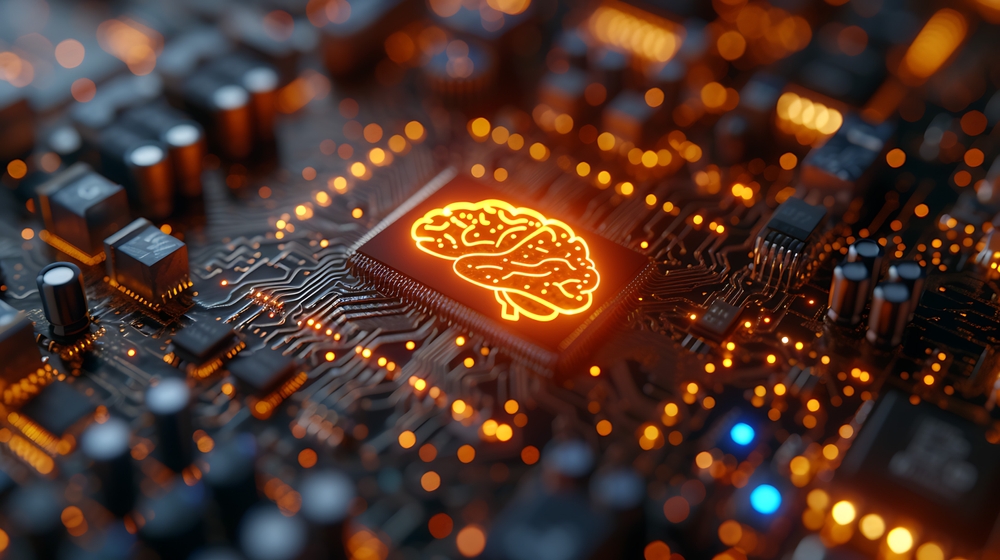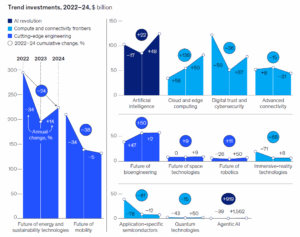
(Treecha/Shutterstock)
What frontier technologies should businesses look to for competitive advantage in 2025? One place to look is the management and consulting firm McKinsey & Company, which recently published its fifth annual “Technology Trends Outlook.”
McKinsey’s analysis takes into account equity investment, patents, search trends, and talent demand to determine what business leaders should be looking for, while analyzing the biggest innovations in business-transforming technology within this past year.
Here’s a summary of what McKinsey had to say:
Agentic AI
Out of these tech trends McKinsey analysts choose to highlight is agentic AI, which they describe as – a “virtual coworker that can plan and execute workflows.” They observe that $1.1 billion of equity investment went into the technology in 2024, with a total of $124 billion invested into AI technology. There has been a jaw-dropping 985% increase in job postings from 2023, they write.
McKinsey explains that AI has seen so much investment due to diverse use-cases. It cites companies using AI for “last-mile logistics, navigating dynamic environments, or acting as virtual coworkers.” Indeed, as this article explores, AI has taken a far more dynamic, autonomous role in our lives recently: The goal of many mobility and logistics companies is to remove as much friction as possible between the user and the software.
Application-Specific Semiconductors
McKinsey also observes that as a result of agentic AI development, companies have invested into application-specific semiconductor innovation. All of the technologies that they discuss require innovations in application-specific semiconductors, whether that be new ways to manage “cost, heat, or electric power consumption.”
AI training also requires “exponentially higher computing capacity, memory, and networking,” the article points out. These demands translate into a need for further semiconductor innovation.
As a result of these needs, $7.5 billion worth of equity investment has gone into application-specific semiconductors, the group says. McKinsey points out that despite the need for further research into semiconductors, Moore’s Law, the empirical observation that the number of transistors inside a circuit doubles every two years, continues to hold.
Advanced Connectivity
With much of the globe joining the data race, a need has arisen for scaling communications technology. Moreover, many devices now have “smart” capabilities: McKinsey points out that the need for devices to communicate with the cloud now applies to “phones, cars, home controls and industrial devices.”
The technology made to accommodate increasing connectivity demands “includes wireless low-power networks, 5G, cellular systems, and low-earth-orbit satellites.” As a result, $44.2 billion worth of capital has been invested into advanced connectivity tech, the group says.
Cloud/Edge Computing
Many companies do not have the capital to invest in large-scale data centers, so they outsource their computing to regional nodes. As more and more companies outsource their AI processing power to the cloud, they discover a need to improve “latency, transfer costs and security.” McKinsey observes that many companies are moving their data centers to areas with more advanced infrastructure and adopting sustainable power programs, as well as investing in more advanced liquid cooling solutions.
In fact, Meta has developed “specialized data center networks that use GPU clusters to support AI training.” The result are data centers that are optimized for AI-related tasks, such as “ranking, content-recommendation and natural-language-processing.”
The result is $80.8 billion worth of equity invested into cloud technology.
Immersive Reality Technology
Immersive reality technology has been relatively quiet this year, but 2024 saw the release of Apple’s vaunted Apple Vision Pro and Meta’s Quest 3S. Moreover, Meta and Ray-Ban have partnered to release their lightweight AI glasses. McKinsey tracks around $6 billion worth of equity investment into the technology.
Cybersecurity
As previously mentioned, companies work with data in regional cloud storage centers. Protecting this data has become a lucrative industry, with McKinsey reporting that $77.8 billion dollars worth of equity has been invested into the technology.
Quantum Computing
Today, quantum technology is only a budding industry: With most companies focusing on AI, it hasn’t received as much attention in the business-technology landscape. However, its application in “complex calculations and secure communication networks” has netted it $2 billion in equity investment, per McKinsey.
McKkinsey highlights investment into “increased qubit reliability and real-time error mitigation,” in hopes that quantum software can become more precise and reliable. They observe how Atom Computing recently achieved a “99.6% two-qubit gate fidelity, a significant advancement in error correction capability.”
McKinsey also highlighted Google’s Willow Chip, a chip that “can reduce errors exponentially when scaling by adding more qubits.” It is clear that quantum technology is beginning to pick up pace, with companies making breakthroughs in various aspects in quantum technology.
Future of Robotics
AI-augmented robots have enjoyed increased attention for their potential industrial use, McKinsey pointing out their “capability to perform tasks autonomously or semi-autonomously.” This attention has culminated in $7 billion dollars in equity investment.
Future of Mobility
Autonomous vehicles, such as the ones manufactured by Tesla and Waymo, have improved significantly with innovations in AI technology. The result has been a staggering $131 billion dollars of equity invested into autonomous vehicle technology, McKinsey says.
Bioengineering
Artificial intelligence has also significantly accelerated genome cartography and gene editing: the result is a substantial $57 billion worth of equity investment into the technology. McKinsey highlights how AI can speed up drug development, writing that “AI supports the rapid design of compounds by modeling unique molecular structures.” Moreover, AI can model cell culture systems and design tissue architecture for stem cell research.
Space Technology
Private investment into space technology totaled $9.3 billion this year, with “satellite constellations and direct-to-device connectivity” making the bulk of said innovation, according to McKinsey.
Energy Sustainability
Notably, energy sustainability technology received the most equity investment in 2024, with an eye-watering $223.2 billion worth of equity invested into sustainability tech. This includes “clean electrons, electrification, clean molecules,” and a host of other technologies geared towards cleaning up our global energy system, McKinsey says.
McKinsey observes that “the demand for electricity has surged significantly,” drawing upon data centers (often used for AI training) as one of the biggest contributors to this demand. These energy needs place a large pressure on host city’s power grids, furthering an urgent need for decarbonization programs. However, McKinsey observes that these host cities have such high energy needs they construct “gas plants and engines alongside battery energy storage systems to ensure energy availability during peak periods.”
As data centers and other big data processing technologies place a heavy weight on our energy grid, it is clear that there is an urgent need for clean, sustainable and efficient energy systems.
Conclusion
To conclude, companies have invested in a wide array of technology, ranging from cybersecurity to bioengineering. Some notable outliers, however, include the massive amounts of capital invested into energy sustainability and the future of mobility. It remains to be seen, however, as to what these capital investments will mature into, and as to how these technologies will improve corporate workflows and day-to-day life.
Related Items:
Many Big AI Models Fail to Pass Benchmark for Human Flourishing, New Gloo Study Reports
Top 10 Big Data Technologies to Watch in the Second Half of 2025
2025 Big Data Management Predictions




